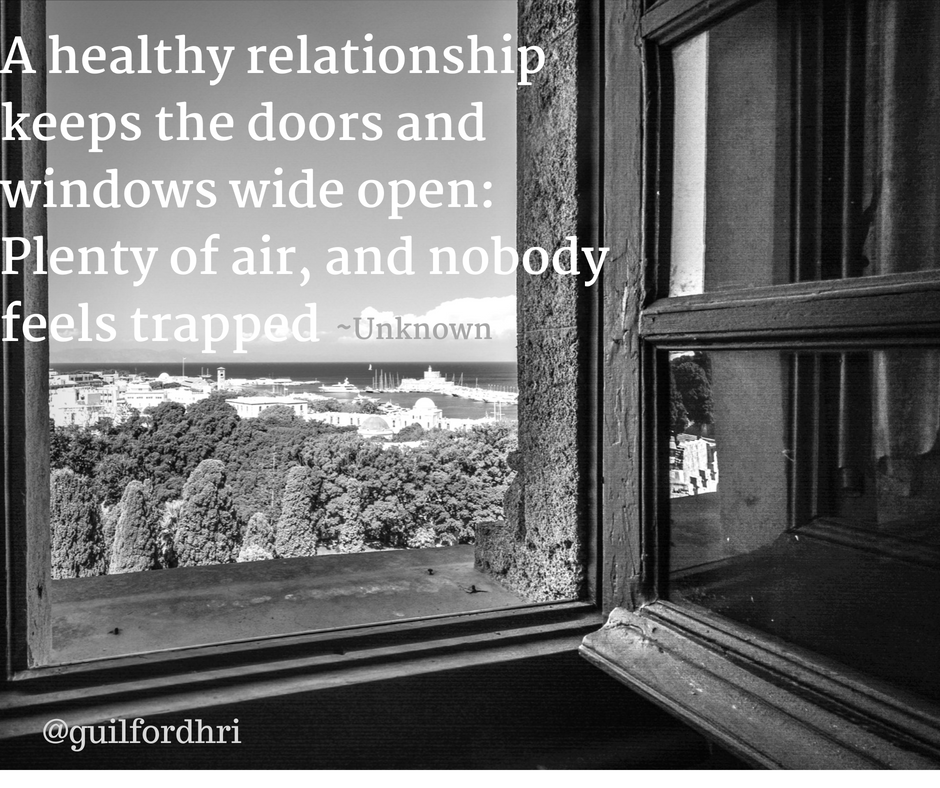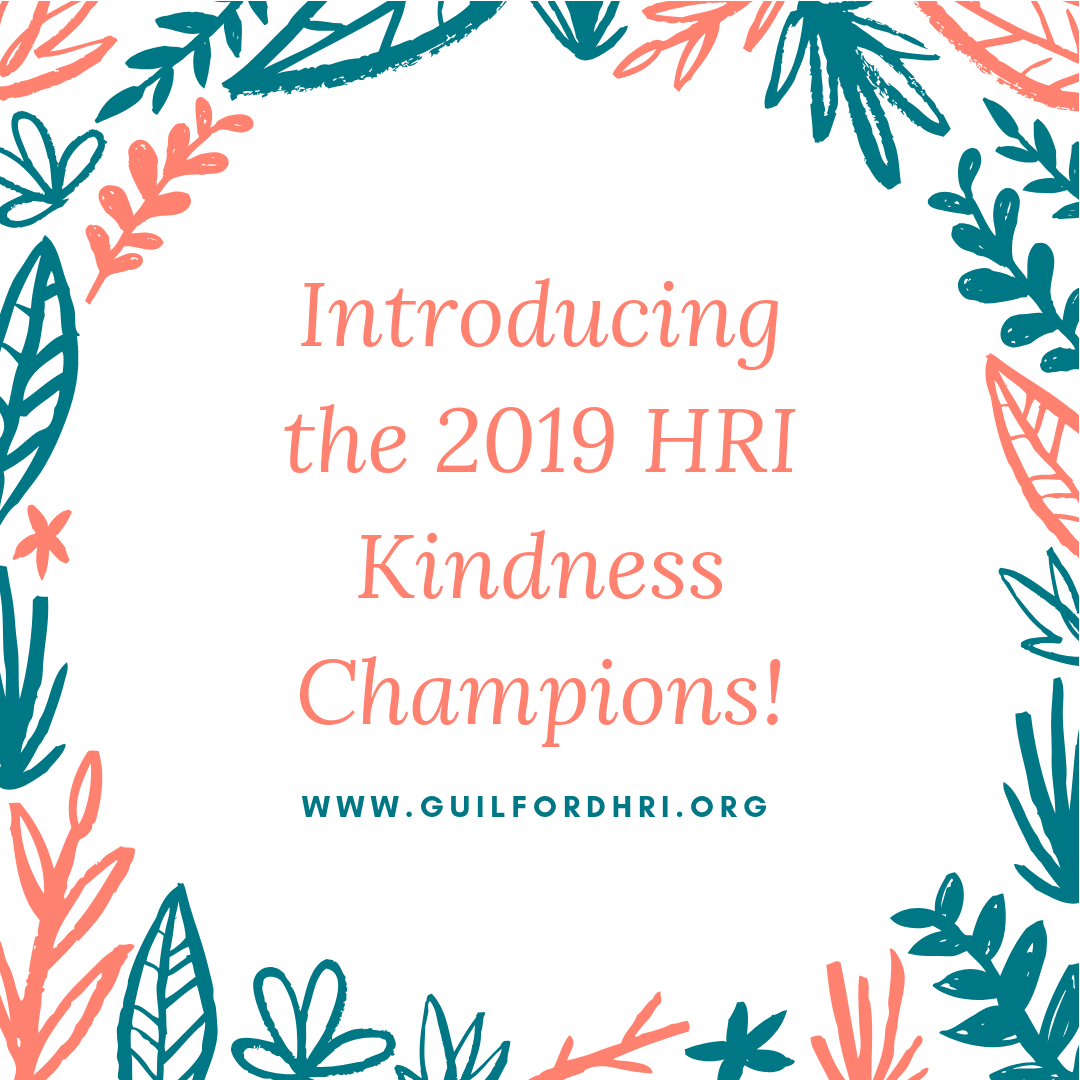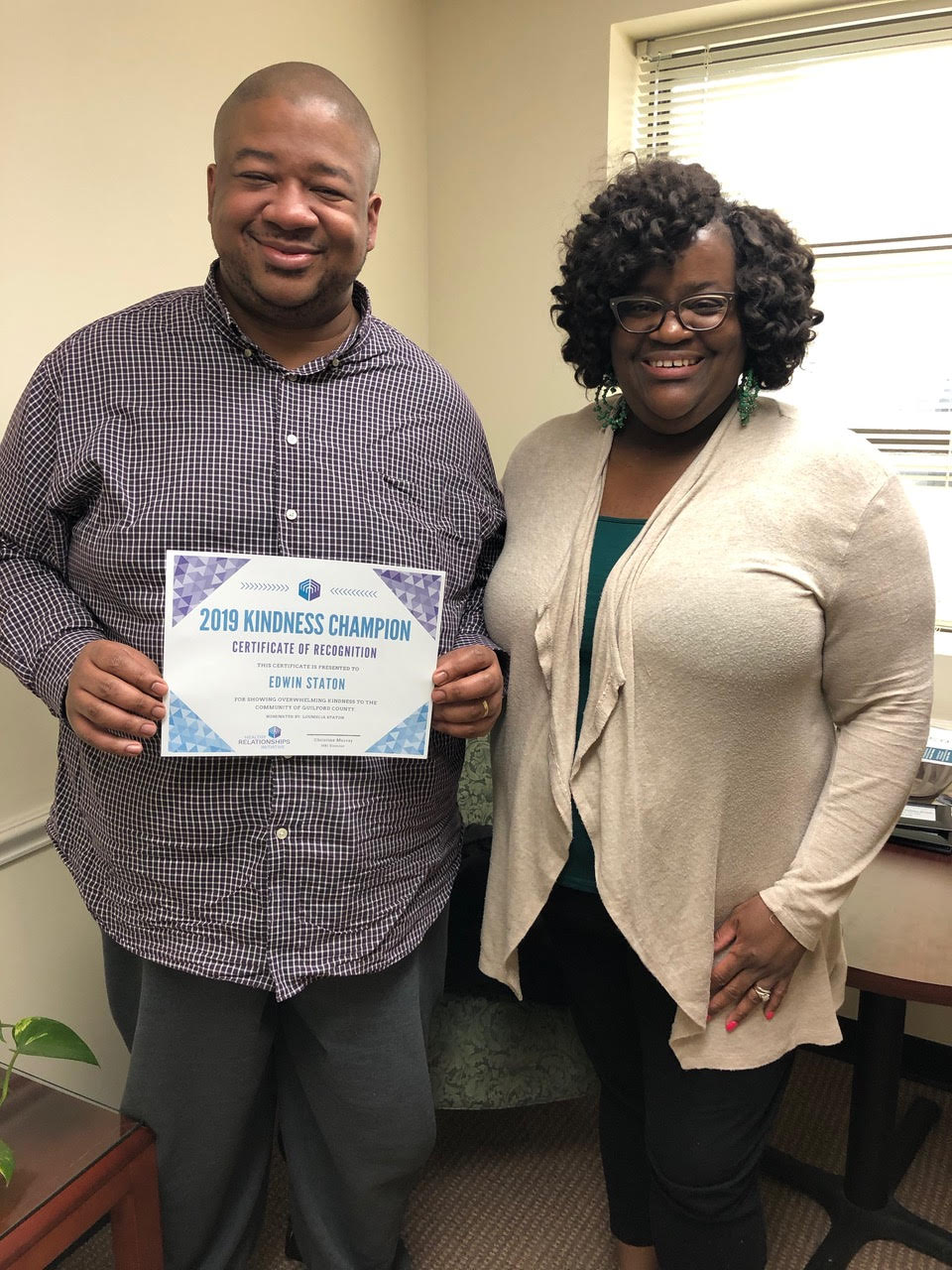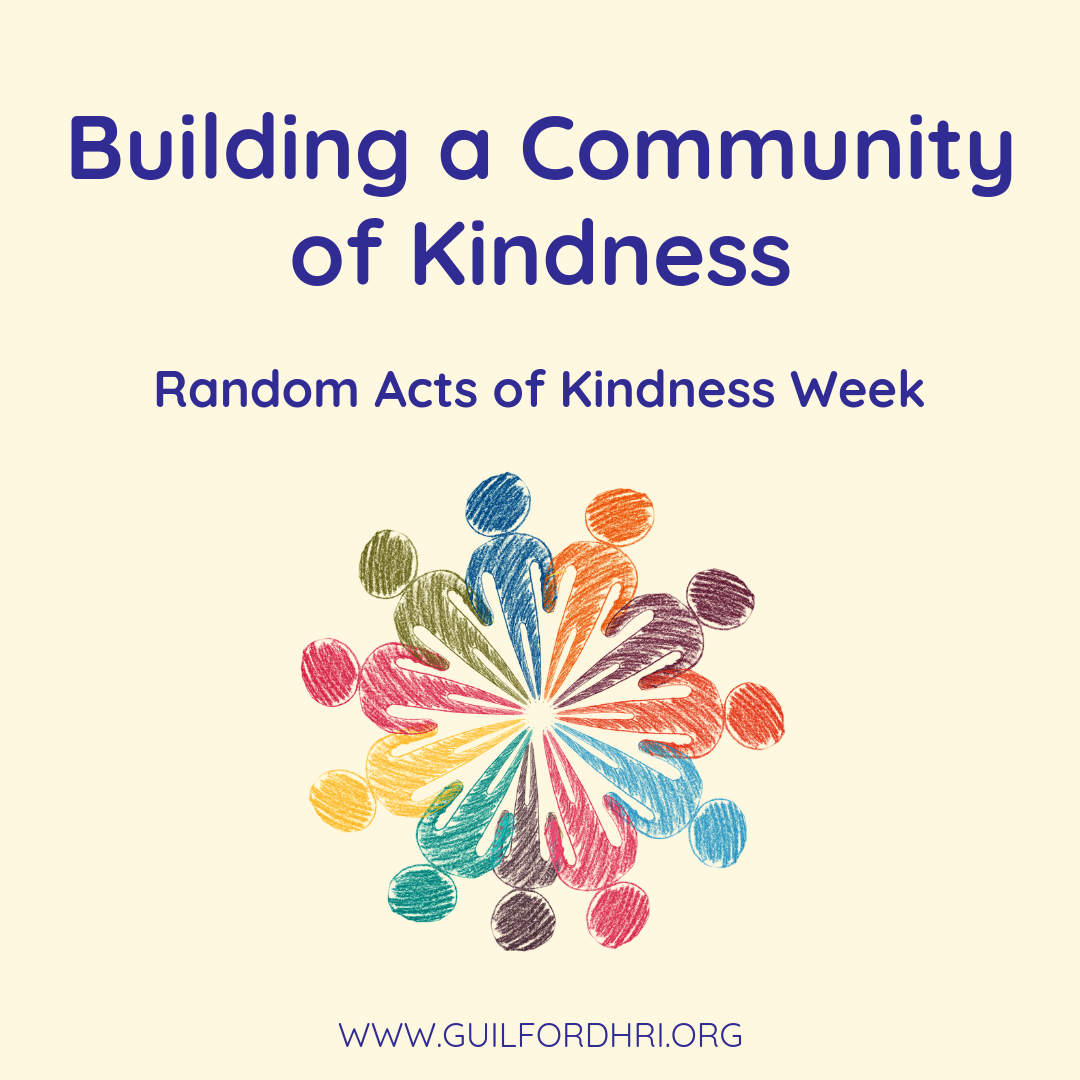
Being Kind to Ourselves

One of the best ways to create a community of kindness is by being kind to ourselves. When we treat ourselves with respect and compassion, we can be the best versions of ourselves. We are better equipped to help others and spread kindness throughout our community when we feel good physically, mentally, and emotionally. We can also teach others to take care of themselves and prioritize their own physical, mental, and emotional health through leading by example.
We encourage you to be kind to yourself by engaging in self-care! Find something that is relaxing, brings you joy, and nurtures your mind, body, and spirit, and do it as often as possible.
As Random Acts of Kindness week comes to an end, we want to remind you that promoting kindness is a lifelong process and it is important to continue to build a community of kindness well beyond this week. Make kindness a part of who you are!
Kindness through Nonprofits

By Eleanor Beeslaar
Community nonprofits work year-round to help individuals and families in Guilford County live healthier and happier lives, and they put a lot of effort into strengthening our community. A great way for us to spread kindness throughout our community is to help these organizations accomplish their missions and reach their goals!
Though donating money is always an option, it’s not necessary to help build a stronger, kinder community. A wonderful way to give back to the local nonprofits that serve our community is to volunteer. This is something that can be done individually, with friends and family, and even through schools, universities, and workplaces. We encourage you to celebrate Random Acts of Kindness Week by finding a local nonprofit to volunteer with!
A great place to get started is by visiting The Volunteer Center of Greensboro’s website!
Kindness in Schools

By Eleanor Beeslaar
Kindness is essential to positive growth and learning, as it promotes healthy relationships and helps us develop lifelong skills that can lead to future success and fulfillment. Schools and universities encompass this spirit of growth, learning, and development, and have a unique platform to spread kindness throughout our community. By teaching students about kindness and encouraging them to engage in acts of kindness with their peers, teachers/professors, and community, schools and universities can vastly spread the impact of kindness in our community.
Teachers and professors can show kindness through their actions towards students. This doesn’t mean they need to bring them treats or give them extra credit (although, that is surely always appreciated). Instead, it can be something as simple, yet essential, as speaking to them with compassion and approaching their role as an educator with understanding and empathy. A great way for teachers to promote kindness in the classroom is by incorporating it into their curriculum. The Random Acts of Kindness website has many amazing resources for teachers, including free kindness lesson plans! Universities can also spread kindness by showing appreciation for their students, as well as creating events that encourage students to show acts of kindness to their peers, professors, and university staff.
For more ideas about how you can incorporate kindness at schools visit https://www.randomactsofkindness.org/kindness-ideas.
Introducing the 2019 HRI Kindness Champions of Guilford County!

Today, HRI is celebrating Random Acts of Kindness Week by announcing our 2019 HRI Kindness Champions, who were nominated by members of the Guilford County community. We are delighted to honor these wonderful individuals, who have worked so hard to build a community of kindness in Guilford County!
Continue reading to learn more about the Kindness Champions and the amazing ways they have worked to spread kindness in our community.
Tony Hamilton: Tony Hamilton was nominated by three of his UNCG co-workers. They said he’s deserving of being recognized for his kindness for the following reasons: “Every new semester, Tony plants himself at the front door of our building and directs students to where they need to be. He has done this year after year and it is appreciated by our student body. He does this on his own, just to help out students who have no idea where they are or where they’re going. He is helpful and kind and will bend over backwards to help you with anything you’ve got going on. He has helped me move furniture on several occasions. He also strives to do his best to clean his area of the building and keep things looking good for all of us.” Another one of his nominators added, “Tony genuinely cares about the well-being of faculty and staff, encouraging us to pay attention to our own self-care, rest and take breaks. When I had difficulty with the lock on the mail room door one day, he came right over. He conscientiously answers the call of duty, and goes beyond the call of duty. When my daughter came to work with me, he bought her a blueberry muffin, which she thoroughly enjoyed. That was a spontaneous act of kindness and generosity that really brightened her day. ”
 Shannon Axtell Martin: Shannon Axtell Martin’s nominator shared why she stands out as a role model of kindness in our community: “Her kindness is a magnet to everyone around her. You can constantly find her striking up conversations with strangers and leaving smiles in her wake. She is also gifted at building kind and uplifting community among women in the face of a culture that teaches women to be critical, catty, and judgement toward one another. I have never met someone whose kindness draws people together and who forms and maintains so many positive and genuine relationships. She is always encouraging and uplifting, as well as exceedingly generous. If I had to identify the face of kindness, it would be Shannon!”
Shannon Axtell Martin: Shannon Axtell Martin’s nominator shared why she stands out as a role model of kindness in our community: “Her kindness is a magnet to everyone around her. You can constantly find her striking up conversations with strangers and leaving smiles in her wake. She is also gifted at building kind and uplifting community among women in the face of a culture that teaches women to be critical, catty, and judgement toward one another. I have never met someone whose kindness draws people together and who forms and maintains so many positive and genuine relationships. She is always encouraging and uplifting, as well as exceedingly generous. If I had to identify the face of kindness, it would be Shannon!”
 Katie Myers: Katie Myers’ nominator had this to say about why she is deserving of this recognition: “Katie Myers has been a Speech Language Pathologist for Guilford County Schools for several years. As a fellow Special Education professional in GCS, Katie Myers stands out to me as a leader for other professionals in the county, as well as an avid parent and student advocate. She is someone who always keeps students’ best interests at heart, and is willing to go the extra mile to serve her community. It is not uncommon to see Katie Myers volunteering at different educational events throughout Guilford County, supporting and fighting for the rights of fellow teachers in Raleigh, and working extra hours to bring new programs and clubs to the schools in which she serves. She is passionate about making schools in Guilford County, and all over, a better place for children and teachers alike. She meets every obstacle with a smile and a tender heart, and can always be counted on to brighten your day. Katie Myers is a true educator with a heart of gold. She is undoubtedly a champion of kindness in Guilford County.”
Katie Myers: Katie Myers’ nominator had this to say about why she is deserving of this recognition: “Katie Myers has been a Speech Language Pathologist for Guilford County Schools for several years. As a fellow Special Education professional in GCS, Katie Myers stands out to me as a leader for other professionals in the county, as well as an avid parent and student advocate. She is someone who always keeps students’ best interests at heart, and is willing to go the extra mile to serve her community. It is not uncommon to see Katie Myers volunteering at different educational events throughout Guilford County, supporting and fighting for the rights of fellow teachers in Raleigh, and working extra hours to bring new programs and clubs to the schools in which she serves. She is passionate about making schools in Guilford County, and all over, a better place for children and teachers alike. She meets every obstacle with a smile and a tender heart, and can always be counted on to brighten your day. Katie Myers is a true educator with a heart of gold. She is undoubtedly a champion of kindness in Guilford County.”
 Edwin Staton: Edwin Staton was nominated by his wife, LouMecia Staton (pictured with Edwin here). LouMecia had this to say about why Edwin is a true champion for kindness in our community: “I would like to nominate my husband, Edwin Staton as a Kindness Champion! His life’s motto is truly service to God, his family and to mankind, and he exemplifies the words honor, loyalty and support to our community. Edwin is an active community volunteer and also serves at our church as a Deacon, which he truly loves and holds dear to his heart. In one of his roles as a volunteer, he makes sure to share community events and programs with his co-workers and anyone that he meets in the community that can benefit from various community programs serving Guilford County. He is a wonderful husband and friend, a loving son and brother and an outstanding uncle to all of our nieces and nephews and is even an Eagle Scout! He loves serving others and being of help to anyone he meets along the way. He is truly a blessing in my life and that is why I would be honored to nominate him as a Kindness Champion in Guilford County.”
Edwin Staton: Edwin Staton was nominated by his wife, LouMecia Staton (pictured with Edwin here). LouMecia had this to say about why Edwin is a true champion for kindness in our community: “I would like to nominate my husband, Edwin Staton as a Kindness Champion! His life’s motto is truly service to God, his family and to mankind, and he exemplifies the words honor, loyalty and support to our community. Edwin is an active community volunteer and also serves at our church as a Deacon, which he truly loves and holds dear to his heart. In one of his roles as a volunteer, he makes sure to share community events and programs with his co-workers and anyone that he meets in the community that can benefit from various community programs serving Guilford County. He is a wonderful husband and friend, a loving son and brother and an outstanding uncle to all of our nieces and nephews and is even an Eagle Scout! He loves serving others and being of help to anyone he meets along the way. He is truly a blessing in my life and that is why I would be honored to nominate him as a Kindness Champion in Guilford County.”
Kindness in the Workplace

By Eleanor Beeslaar
An important part of creating a community of kindness is being kind to the people in your workplace. Creating a kinder, more inviting workplace can help increase feelings of belonging, leading to greater job and life satisfaction. By doing nice things for your supervisor, employees, or coworkers, you can help create a more harmonious environment at work, spreading feelings of peace and optimism. A few words of encouragement, a kind note, or a surprise cup of coffee may be the thing that inspires a smile during an especially stressful week.
Another great way to build a community of kindness is to be respectful and kind to others in their workplace. Whether you are eating at a restaurant, going grocery shopping, or waiting at the doctor’s office, it is important to show kindness to the employees who are there to help you.
We encourage you to think about how you can show kindness in your own workplace and when interacting with others in their place of employment. Here are some great ideas to start with:
- Write a note or send an encouraging email.
- Compliment someone for their hard work.
- Make an effort to get to know the people you work with.
- Bring a coworker a cup of coffee.
- Invite a coworker to eat lunch with you.
- Pack an extra snack for someone who may need it.
Kindness with Family and Friends

By Eleanor Beeslaar
There are many great ways to show kindness to your family and friends! Whether it’s spending quality time together or doing something special for them, spreading kindness to your family and friends strengthens your relationships and brings feelings of joy to both you and your loved ones.
When thinking about how you can show kindness to your friends and family members, know that you don’t have to do anything extravagant to show that you care. Sometimes, smaller acts of kindness can have the most meaning. Think of what truly brings joy and happiness to the people you love, and remember to get creative and have fun with it! Here are some ideas to get you started:
- If you have kids in college, ship a care package to let them know you’re thinking of them.
- Help out with chores! This is a great way for both partners and kids to show their appreciation.
- Give a friend or family member a small gift, such as a card or a book they’ve been wanting to read.
- Write a letter giving the reasons why you appreciate someone.
- Take a friend out for coffee or lunch.
These are just a few of the many ways you can show kindness to your family and friends. For more ideas visit https://www.randomactsofkindness.org/kindness-ideas.
Practicing kindness in your family not only creates deeper connections and stronger bonds, but it also teaches children the value of being kind to others! Getting the whole family involved in Random Acts of Kindness Week is a great way to spread joy and love into the community. Make it a fun family activity and work together to come up with different acts of kindness you can do for people in the community! Whether it’s donating toys or clothes to a local charity or shelter, writing kind notes to friends and neighbors, or simply letting someone go in front of you in line at the grocery store, there are many ways you can work together as a family to spread kindness!
Celebrate Random Acts of Kindness Week with HRI!

Kindness is a fundamental part of building strong families and communities. It encompasses genuine concern and consideration for others and evokes feelings of love, gratitude, and belonging. By showing kindness to ourselves, our friends and family, and the many different members of our community, we spread joy, love, and hope, creating a durable and welcoming community.
HRI is committed to building a community of kindness by spreading knowledge, encouragement, and inspiration. In honor of Random Acts of Kindness Week, we will be providing tips to help community members spread kindness to one another throughout this week and for years to come!
Take the HRI Healthy Relationships Pledge!

I’ll show kindness & respect in my relationships.
I’ll expect kindness & respect from others.
I’ll know where to get help if my or my friends’ relationships are unhealthy.
Healthy relationships are an essential part of living happier, more fulfilling lives and building strong families and communities! We encourage you to not only strive for healthy relationships in your own life, but also to support and promote healthy relationships among your friends and family members, as well as throughout your community. Make the choice to commit to healthy relationships by agreeing to the Healthy Relationships Pledge!
- I’ll show kindness & respect in my relationships.
Kindness and respect are essential elements in healthy relationships. They foster trust, compassion, and love, leading to stronger, more fulfilling connections.
Kindness is a key factor in creating stability and satisfaction within relationships, as it leads to partners feeling understood, validated, cared for, and loved. It involves maintaining a spirit of generosity within your relationship and readily showing affection, care, and concern for your partner. Showing kindness means meeting your partners need and desire for love and connection even when you are feeling stressed or tired. It is so easy to shrug off these small moments in your relationship by passively responding to your partner’s requests for connection; however, when you make the decision to show kindness during these moments, it can make a world of difference. Another important part of showing kindness in your relationships is by celebrating your partner’s successes with genuine joy and admiration. When you express happiness and pride for your partner’s accomplishments, you send the message that they are valued and loved.
Kindness is not always easy, especially during periods of conflict. Healthy relationships require hard work, and it takes patience and practice to choose to treat your partner with kindness. In healthy relationships, partner’s show kindness even when they are angry by expressing their frustrations and emotions without attacking or criticising one another.
Healthy relationships are built on mutual respect. In respectful relationships, partners can communicate openly and honestly, maintain healthy boundaries, compromise effectively, and feel comfortable to be themselves. Healthy relationships also involve showing respect during disagreements by valuing one another’s opinions even if you do not agree with them. You can show respect in your relationship by trusting and supporting your partner, as well as valuing their freedom and independence within the relationship.
Here are some things to keep in mind when thinking about how you can show kindness and respect in your relationships:
- Listen to what your partner has to say.
- Communicate openly and honestly.
- Value your partner’s needs and emotions.
- Support your partner’s passions and interests.
- Honor your partner’s boundaries.
- Use kind words.
- Build your partner up.
- Give your partner space to be themselves.
- Value your partner’s independence.
- I’ll expect kindness & respect from others.
We’ve talked a lot about what you can do to show kindness and respect in your relationships, but it’s important to remember that you also deserve to receive respect and kindness from others! A critical part of having healthy relationships is expecting your partner to treat you with kindness, compassion, love, and respect. You are worthy of love and happiness and deserve to feel valued and cared for in your relationships.
Your partner should speak to you with words that show kindness and compassion. They should celebrate your individuality and give you freedom and space to be independent. You deserve to be heard and validated when you express your needs and emotions, and your hobbies and interests should be valued and appreciated.
A vital part of expecting kindness and respect from others is knowing your worth, practicing self-love, and having self-compassion. Be kind to yourself and know that you deserve respect regardless of your imperfections. When we respect and accept ourselves for who we are, we can more easily expect the same thing from others.
- I’ll know where to get help if my or my friends’ relationships are unhealthy.
A critical aspect of promoting healthy relationships in our own lives and in the lives of our loved ones is to know where to seek help in the case of unhealthy and/or potentially abusive relationships.
It’s normal to hit a rocky patch in relationships, where it may feel harder to communicate effectively or you and your partner feel disconnected. In these cases, it can be helpful to engage in individual and/or couples counseling with a professional counselor. For college students at The University of North Carolina at Greensboro, two great options that provide both individual and couples counseling are The UNCG Counseling Center and The Nicholas A. Vacc Counseling and Consulting Clinic, which is also open to community members. There are many other wonderful options for counseling throughout the community. A great way to locate a counselor is to use one of the following directories:
Though relationship struggles are normal, it is NEVER okay to experience harm or feel unsafe in your relationships. If you or someone you know feels unsafe and is experiencing emotional, psychological, physical, sexual, or verbal abuse in a relationship, it is important to seek help safely. A crucial part of being prepared for the potential of an unhealthy and/or abusive relationship, is to know the warning signs and be educated about helpful resources and services within your community.
We encourage you to become familiar with the warning signs of unhealthy, abusive relationships listed below:
- Extreme jealousy
- Manipulation:
- Using gifts and apologies to seek forgiveness after abusive actions.
- Using guilt trips to influence actions or decisions.
- Isolation from friends and family.
- Public humiliation
- Keeping someone from succeeding in work, school, or practice.
- Threatening to share private and/or embarrassing information.
- Name calling
- Body shaming
- Extreme emotions, such as outbursts of anger.
- Physical violence towards others or property.
These are only some of the potential warning signs. It is important to continue to educate yourself about the risks and signs of relationship abuse. Here are some helpful resources to check out:
It is important to know where to get help if you or someone you know is in an unhealthy and/or abusive relationship. Here is a list of national and local resources that support and assist individuals experiencing relationship abuse:
- The National Domestic Violence Hotline: 1-800-787-3224
- The Guilford County Family Justice Center
- Family Service of the Piedmont
Keep in mind that it is not uncommon for individuals in abusive relationships to resist help or be reluctant to leave the relationship due to a myriad of reasons. The best thing you can do to help someone in this situation is to support them with whatever they need, regardless of whether or not you think it is what is best for them.
We hope that this information will help you feel more prepared to seek help in your own relationships or support a friend experiencing an unhealthy relationship!
Respect and Kindness in Teen Relationships

By Eleanor Beeslaar
Dating is an exciting and fun part of life! Though there are many different qualities and characteristics that make you attracted to someone, it is important to look for someone who treats you with respect, shows you kindness, and understands what a healthy relationship is.
Here are some things to look out for when searching for a potential partner:
- They listen to your ideas and are willing to compromise with you.
- They support your passions and interests.
- They aren’t afraid to share their thoughts or feelings.
- They respect your boundaries.
- They communicate openly and honestly.
- They trust you.
- They treat you with respect.
- They don’t pressure or threaten you into doing things you don’t want to do.
- They never put you down.
Everyone deserves to be with someone who makes them feel safe, accepted, and valued! We hope that this information will help you have happier, healthier, and safer relationships.
